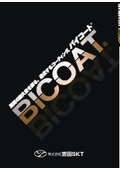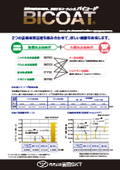[Presentation of Coating Materials] We will introduce "galling," which leads to a decline in the appearance quality and dimensional accuracy of molded products, resulting in a deterioration of product quality.
"Die biting" refers to the phenomenon where resin sticks to or gets caught in the mold, causing scratches or defects in the molded products. This can occur when resin adheres to the mold's gates or flash surfaces, or when the mold patterns do not transfer to the surface of the molded products. When die biting occurs, it can lead to a decline in the appearance quality and dimensional accuracy of the molded products, potentially worsening product quality. Additionally, it may necessitate repairs or maintenance of the mold, which can adversely affect productivity. **Methods to Prevent Die Biting:** Surface Treatment: Properly treating the surface of the mold makes it less likely for resin to stick to it. Improvement of Gate Design: By considering the flowability of the resin and the balance of forces during withdrawal, a gate design can be implemented that prevents die biting. Optimization of Molding Conditions: Optimizing molding conditions can make it less likely for resin to stick to the mold. For example, it is important to appropriately set molding conditions such as molding temperature, injection speed, injection pressure, and holding pressure. Mold Maintenance: Proper maintenance can prevent the occurrence of die biting. Effective measures include cleaning the surface, correcting gates and flash surfaces, and using air blow.
Inquire About This Product
Related Videos
basic information
Common surface treatments used for molds include: 1. Plating 2. Anodizing 3. Fluororesin coating 4. Mirror finishing 5. Electrolytic polishing 6. DLC (Diamond-Like Carbon) 7. TiN (Titanium Nitride) However, conventional surface treatments may not meet the desired functions such as strength and release properties, and improvements may not be achieved as expected. The technology that realizes the combination of "strength + anti-adhesion and slip properties comparable to fluororesin coating" is our original surface treatment 'BICOAT'. [Main Types of BICOAT(R)] ■ NYK-01 - A surface treatment that combines a nickel-based metal coating with fluororesin. ■ NOO-01 - A surface treatment that combines a chromium-based metal coating with fluororesin. ■ TYS-03 - A surface treatment that integrates fluororesin into a chemical conversion coating that reacts with iron ions in the metal substrate. ■ NYN-11 - A surface treatment that combines fluororesin with an alumina coating. ■ CTT-200 - A surface treatment that combines siloxane-based resin with a metal coating. *For more details, please click on "PDF Download" or feel free to contact us.
Price range
Delivery Time
Applications/Examples of results
【Applications】 ■ Rubber injection molding molds ■ Molds requiring dimensional accuracy for release ■ Parts requiring wear resistance and slip ■ Parts requiring wear resistance and non-stick properties ■ Release of adhesives and sticky materials *For more details, please refer to the PDF document or feel free to contact us.
catalog(4)
Download All Catalogs

News about this product(1)
Company information
To maximize the performance of manufacturing equipment and machine parts, Yoshida SKT derives the "optimal solution" tailored to our customers from hundreds of surface treatment technologies. - Decreased productivity due to adhesive troubles - Instability in product quality due to friction - Early deterioration of equipment due to corrosion We respond to these challenges in the manufacturing field with our extensive track record and reliable technical expertise. In 1963, we began fluoropolymer processing. In 1968, we signed a licensing agreement with DuPont (now Chemours), supporting manufacturing innovations for over 2,000 customers across various industries, from automotive to medical and aerospace. Furthermore, in 2024, we are focusing on the development of next-generation products, such as PFAS-free coatings, contributing to the advancement of sustainable manufacturing. With a three-base system in Nagoya, Tokyo, and Yamaguchi, we flexibly respond to both mass production and custom orders. Our consistent quality management system ensures that we deliver reliable quality. For solving challenges in the manufacturing field, trust the surface treatment experts at Yoshida SKT.














